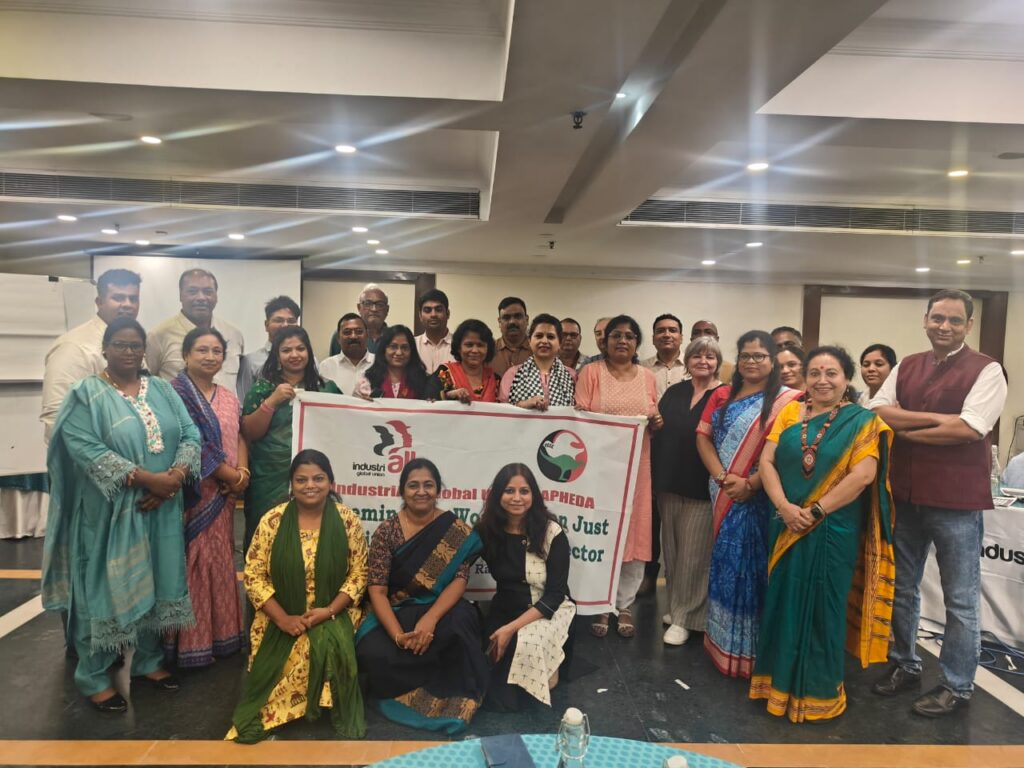12 August, 2025With its renewable energy sector expanding rapidly while traditional sources such as coal continue to grow India is currently at a crossroads. Despite the heavy reliance on coal, the country has begun closing mines and shifting to renewables as part of its efforts to achieve the 2070 net-zero target. In this context, it is crucial to understand workers’ concerns and advocate for worker-centered policies to ensure a Just Transition.
IndustriALL, in collaboration with APHEDA and ITUC’s Just Transition Centre, has conducted research from the perspective of workers’ unions to develop strategies that safeguard workers’ rights during the country’s energy transition. The dissemination meeting for the coal mining sector transition study was held on 25–26 July in Ranchi, while the meeting for the study on challenges and opportunities for organising in renewable energy projects took place in Delhi on 28–29 July.
The study on the renewable energy sector highlights that, as production costs fall and government support grows, the sector is likely to attract increasing investment in the future. India has already achieved its Nationally Determined Contribution target of reaching 50 per cent of its installed electricity capacity from renewable sources. But the sector is rife with low-paying temporary jobs with harsh working conditions and a poor unionization rate. The renewable energy sector has created over 1.3 million jobs, but the majority are precarious in nature.
Workers involved in installation and maintenance of solar panels are forced to endure heat stress as the large solar fields are deprived of any shade. Workplace safety issues such as snake bite and electric shocks are rampant. Workers employed at these sites are temporary, hired through contracting agencies and are paid poverty wages. In Rajasthan, one of the top provinces in India where solar power plants are coming up rapidly, wages are as low as INR 285 (US$ 3.2) per day.
Coal unions warn of declining job security
The coal mining sector study found that trade unionists reported around 300,000 permanent and 500,000 contract workers are currently employed in the industry. In addition, over 1.4 million people depend on the industry for their livelihoods. Coal unions expressed concern over the decline in permanent workers, as recruitment for these positions has been frozen, weakening union influence in the sector. At the same time, the hiring of contractual staff is increasing, leading to a complete erosion of the decent work regime. Growing privatisation, along with the outsourcing of tasks such as mine development, operations and equipment hiring, has further undermined workers’ rights and benefits.
The study highlights that considering India’s net-zero commitments, several public sector mines have been ‘closed’ or abandoned, and unplanned mine closures have neglected workers’ rights or rights of communities dependent on mines. Union leaders highlighted several concerns during the meeting, including abrupt redeployments to distant mines or workplaces, the lack of consultation with unions on the transition, and the failure to retrain workers for future jobs.
While discussing the adverse and disproportionate impact of transition on women workers and women dependents, unionists emphasized the importance of integrating women’s needs into transition processes. They stressed the need to ensure access to quality jobs, decision-making roles, training opportunities and social infrastructure, supported by gender-disaggregated data and actions to address structural barriers and transition.
Sharan KC from APHEDA, Jacquie MacLeod from ITUC, and Dr S.M.F. Pasha from ITUC-AP shared examples from other parts of the world like Indonesia Spain, Brazil, Germany and South Africa. There, unions work collectively and through intensive advocacy have been able to hold dialogue with governments on the issue of Just Transition and ensure workers’ rights are protected.
Action plans to drive change
In both meetings, participants drafted action plans to push for Just Transition. Some of the key actions include:
- Raise awareness among union members on the issue
- In Coal India Limited, which has set-up a committee on Just Transition, unions will demand that workers are given a seat at the table
- Develop regional and global strategies and global south–south cooperation to ensure an equitable and sustainable future for miners and their dependents
- Advocate for skill development and retraining
- Advocate for decent work and living wages for contract workers
- Conduct capacity building workshops for union members
- Target and organize workforce in top companies in renewable energy sector
- Campaign for wage rise and improved workplace health and safety in the solar energy sector particular
Ashutosh Bhattacharya, IndustriALL South Asia regional secretary, says:
“IndustriALL supports the demands of unions for a Just Transition and social dialogue in India that protect jobs and workers’ interests. Just Transition conversations in India are dominated by top-down policy framings, and in these research studies, we have attempted to invert that logic by placing their concerns, insights and aspirations at the heart of the transition debate. IndustriALL remains committed to strengthening the role of unions and engaging with all stakeholders in shaping Just Transition processes, ensuring that no one is left behind. These reports are a step in that direction.”




